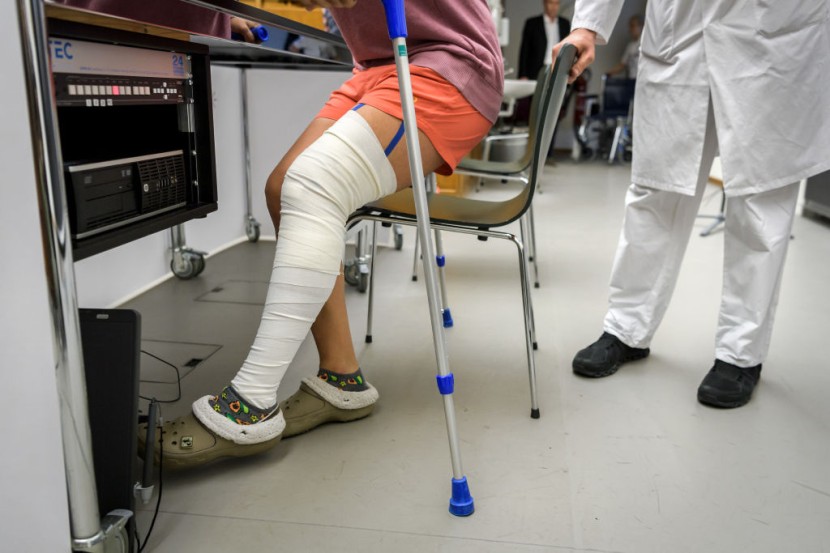
(Photo: FABRICE COFFRINI/AFP via Getty Images) Alpine skiing downhill world champion Slovenian Ilka Stuhec (L) followed by professor Niklaus Friederich (R) arrives to hold a press conference after her knee surgery at Basel's university hospital on October 27, 2017, in Basel.
Exactech started recalling artificial knees, hips, and ankles in August 2021, which led to more than 1,100 patients suing the company.
In a letter to surgeons, Exactech claimed that up to 140,000 implants may have experienced premature deterioration of the plastic in a knee component due to a packaging flaw that dates back to 2004, as reported by CBS News.
Numerous people contend in hundreds of cases that they have undergone or will shortly undergo difficult and dangerous surgeries to repair failed faulty implants.
Exactech does not expressly guarantee its products, but it emphasizes the robustness of its implants in its advertising, even joking that they may outlive their human receivers.
Exactech declined to comment, citing the "ongoing litigation," according to business spokesperson Tom Johnson.
Over the course of three decades, the mom-and-pop device manufacturer blossomed into a multinational firm that sold for $737 million in 2018. Exactech has contended in court documents that its products are not broken and have "an excellent history."
Downplaying Evidence
The firm is allegedly accused of downplaying or hiding evidence of product failures from patients and federal regulators for years, according to a KFF Health News analysis of thousands of pages of court papers in patient lawsuits, a pending whistleblower lawsuit, and other government records.
According to government records, the business took years to disclose negative incidents to a federal database that tracks device malfunctions in hundreds of instances.
Read also: Triple Threat: New Heart Syndrome Linked to Obesity, Diabetes, and Kidney Disease
Concerns Over the Longevity of Optetrak
Whistleblowers claim that Exactech's corporate confidence masks years of cautions and concerns regarding the longevity of Optetrak; one whistleblower described it as an "open secret" within the corporation. The whistleblower lawsuit claims that there were issues with the finned tibial tray, one of the four components of the knee replacement that inserts into the shin bone.
According to court documents, multiple physicians first voiced concerns that the knee implants prematurely loosened, inflicting discomfort on patients and restricting their mobility.
According to claims in patient lawsuits, while 95 percent of artificial knees should survive at least a decade, doctors had to remove and replace numerous Optetrak components much sooner. This involved a challenging procedure known as revision surgery.
In an internal memo, according to court filings, Exactech acknowledged the loosening issue and stated that between 2006 and 2009, the business "began to get some negative feedback" regarding the Optetrak that "was at times confounding and difficult to process."
Court documents show depressing reports included complaints of early revisions from at least 10 American physicians and surgical practices in a number of the more than 30 nations where Exactech supplied the implant.
The outcomes did little to lessen Exactech's chances. According to an affidavit by a company representative, Exactech sold 58,763 Optetrak devices with finned trays from 1994 to April 2022 for use by 514 surgeons nationwide.
Exactech disputes this and claims in a court filing that design changes it made were part of a "natural evolution" of the Optetrak. Many lawsuits contend that rather than alerting patients and surgeons about the loosening problem, Exactech replaced the finned tray component in its newest products, a strategy device industry critics refer to as a "silent recall."
Exactech faced lawsuits and other criticism even as it released newer Optetrak versions, allegedly for failing to disclose exceptionally high surgical revision rates.
Exactech admitted in a court document that it failed to notify the FDA of numerous Optetrak early revision concerns brought by orthopedic doctors Moody and Hutchins.
About 400 instances of Exactech reporting adverse events to the MAUDE database two years or more after knowing of them were discovered by KFF Health News after downloading the FDA data.
According to FDA papers referenced in court filings, inspectors from the FDA who looked through Exactech's internal files in 2017 chastised the business for failing to conduct an "adequate investigation" of concerns.
Exactech vehemently denied that Optetrak is flawed in court documents. Instead, it attributed the loosening issue to the doctors, claiming that they had improperly or incorrectly cemented the knee implants into place.
In 2022, a federal judge in the whistleblower case, in denying a motion to dismiss, found that Exactech was "hard-pressed" to claim it was not required to report the adverse events. The company claimed it had no obligation to report poor outcomes tied to surgeon mistakes, despite the FDA requiring companies to report injuries involving "user error."
Related article: Older American Adults Still Have Higher Probability of COVID-19 Hospitalizations, CDC Claims
© 2026 HNGN, All rights reserved. Do not reproduce without permission.








